Documents
Judgment annulling the November 21 vote
External links
Elections observers (institutions)
Inne teksty polityczne:
O. Zięba: Ideowy i duchowy wymiar jedności europejskiej
Maslak (odczyt, 29.05.2012): Ideologia – nowy początek?
Rosati: Budujmy w Europie unię polityczną
La proposition qui peut détruire la France
Multipleks bez
Rydzyka
ACTA: w czym problem?
Stypendium
im. Krzysztofa Skubiszewskiego
 (en)
(en)
 (ru)
(ru)
Idą wybory — pamiętaj!
Pomian, Modzelewski i Michnik o Okrągłym Stole
 (fr)
(fr)
Lobbyści
dzielą się na lepszych i gorszych
Psucie
kiepskiej konstytucji
Bernard Owen o działaniu systemów wyborczych
(część I
– część II
– część III
– część IV)
 (en: part I –
part II –
part III -
part IV)
(en: part I –
part II –
part III -
part IV)
Potrzebujemy nowych wyborów
Sprawdźcie moje poglądy (spekulacja walutami)
Po co wchodzić do strefy euro
O wartości pieniądza
Karanie polityków, karanie komunistów – przykład raportu Macierewicza
Krzysztof Skubiszewski: Stosunki między Polską i NATO, 1989-1993
Krzysztof Skubiszewski: Podstawy stosunków polsko-niemieckich
Odszkodowanie dla dziecka urodzonego nielegalnie
Do
prezydenta Kirgistanu
Stefan
Meller o stosunkach polsko-rosyjskich
 (fr)
(fr)
 (de)
(de)
Jak głosować
bez meldunku, w podróży lub za granicą
Ulotki, plakaty na wybory
(obywatelska kampania wyborcza, 2007)
O
niewpuszczeniu do Polski obserwatorów wyborczych
Kogo
warto poprzeć (o PiS, LiD i Platformie Obywatelskiej)
Pierwsze
procesy o raport Macierewicza (video)
Błąd
Schrödera, błąd Belki i pierwiastek (o zasadach głosowania
w Unii Europejskiej)
 (de)
(de)
Skąd się wziął
problem z Teletubisiami
Wyrok Trybunału
Konstytucyjnego w sprawie lustracji, przedstawiony czytelnie
Siedem grzechów głównych ustawy lustracyjnej
Decyzja Bronisława Geremka
Raport Macierewicza,
bezpieczeństwo państwa i Trybunał Stanu
Sprawa Alicji Tysiąc
Dlaczego Balcerowicz musi odejść
Komisarz Marcinkiewicz
W PiS jest pusto
Nie oddaj Polski
oszołomom
Kaczyński nie działa jak
Lesiak, on działa jak Putin (o aferze Subotića)
O kombinacjach giełdowych
Cimoszewicza (2005)
 Raport z wyborów prezydenckich na Ukrainie (2004)
Raport z wyborów prezydenckich na Ukrainie (2004)

A personal report from the presidential election in
Ukraine
December 26, 2004
Marcin Skubiszewski

On December 26, 2004, citizens of Ukraine voted to elect their
president. Several thousand international observers were accredited for
the
event. This web page documents what I saw as an observer.
All photos in this document are
clickable (click to enlarge).
The context: what led to the December 26 vote
In recent history, Ukraine has only been an independent nation since
1991. From 1945 to 1991, the entire territory of Ukraine
was part of Soviet Union, and was subject to Moscow's
totalitarian rule. As a result of Soviet heritage, powerful groups
stemming from Russian
and Ukrainian former nomenklatura retained a lot of power over Ukraine,
and, in 2004, were not willing to accept the election of a
president
unconnected with them. This political context influenced heavily the
election.
In this election, the two major candidates were the
pro-Russian and pro-Putin prime minister Viktor Yanukovych
(Віктор Янукович),
and the leader of the opposition Viktor Yushchenko
(Віктор Ющенко),
attached to the independence of Ukraine and to
western-style
democracy and liberal capitalism.
The election was initially held on October 31 and on November 21
(run-off). During the campaign, government-controlled television
strongly supported Yanukovych. During the election, the
secrecy of ballots was often violated, and voters were intimidated.
Massive fraud was organized: according to Yushchenko's supporters,
fraud deprived Yushchenko of 3
million votes. Yushchenko
was poisoned
during the presidential campaign, and spent several weeks struggling
for
life instead of campaigning.
On November 24, the Central Electoral Commission of Ukraine declared
Yanukovych the winner of the November 21
vote. In response, several foreign
governments strongly criticized the election, and hundreds of
thousands of Ukrainians
protested (these protests are commonly called Orange Revolution).
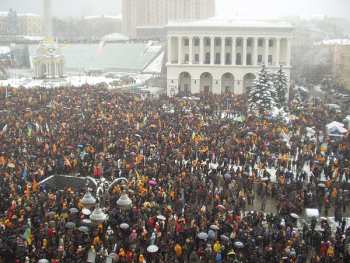
A gathering in the central place of the orange
revolution, the Independence Square (Maidan), Kiev. [source]
[credits]
The Ukrainian government did not use force to suppress the protests
(apparently, part of armed forces was on the side of the protesters,
making
the use of force virtually impossible). Instead, negotiation
started on November 26 between the outgoing president
Kuchma, and
Yushchenko. The negotiation involved high-ranking representatives of
four
foreign powers (the
European Union, Poland, Lithuania and Russia).
On December 3, the
Supreme Court of Ukraine
acknowledged that a host of gross
irregularities had accompanied the November 21 vote, annulled
the vote, and
called a new vote for December 26 (see the Supreme
Court findings in English, the full
text of judgment in Ukrainian).
On December 8, the political solution
negotiated between Kuchma and Yushchenko was implemented: officials who
had participated in
electoral fraud were removed from the Central Electoral Commission, and
a
new electoral law was enacted. The new law allowed both candidates to
be
represented
equally in local electoral commissions, and modified many aspects
of the
electoral procedure in order to prevent fraud similar to the one
observed on
November 21.
The voting procedure, as observed on
December 26
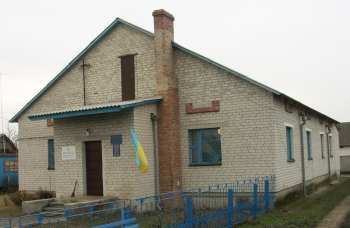
The Vola Kovelska voting station, located in
the village's dispensary.
I observed the election in Vola Kovelska (Воля Ковeльська),
a
village in the Volyn region
(North-West of Ukraine). An overwhelming majority of Volyn
inhabitants supports
Yushchenko.
In Vola Kovelska, I observed no fraud, and no voter intimidation
or other bad-faith behavior connected with the election. People were
very friendly towards me. I cannot tell,
however, that the voting procedure was fully satisfying. This section
describes noteworthy aspects of the procedure.
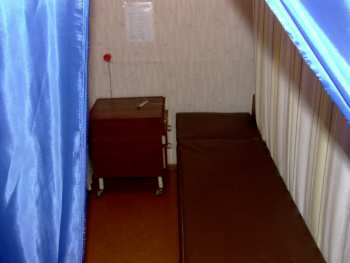
Inside a voting booth in Vola Kovelska.
The voting station was equipped with three voting booths. Each
had an opaque curtain. All voters used the booths to fill in their
ballots (this could appear as obvious to the Western reader, but is
noteworthy given that Ukraine is a former Soviet nation). There was a
bed in each booth; this bizarre
feature was due to the voting station being located in a dispensary.
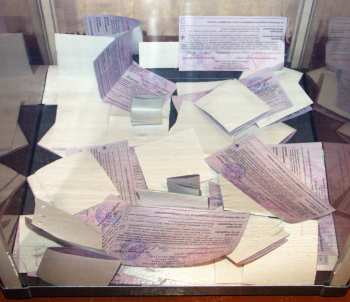
Content of a ballot box in Vola Kovelska, at
10 am.
On the right, you can see ballots in one of
the
ballot boxes in Vola
Kovelska, during the vote. The content of several ballots is in plain
view
(click to
enlarge the photo, and you will
be able
to read the content of five ballots, all five for
Yushchenko;
to understand how to read a ballot, read below).
To preserve voting secrecy, voters can fold their
ballots. Among the ballots visible in the photo, some are not folded.
Others were folded by voters, but later unfolded, and their content is
visible. Additionally,
two ballots are easy to distinguish from all others, because they are
folded in atypical ways.
Two distinct flaws in the voting
procedure are apparent here. First, folding ballots, as it is
done in Ukraine, does not
reliably ensure vote secrecy. The problem is exacerbated by the
possibility to make video tapes of the voting process (official
observers are legally entitled to do this). An observer with a video
camera may exploit
the unreliable way in which folding works, and record who voted for
which
candidate. Reportedly, this was actually done in certain
voting stations during the November 21 vote.
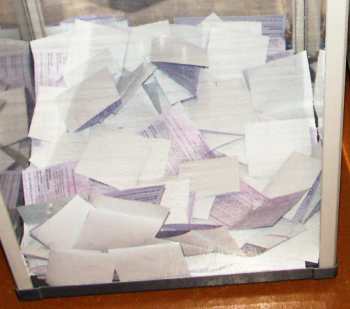
Content of same ballot box as above, at noon.
Second, many people in Ukraine consider that
vote secrecy is an
individual right of the voter, not an
obligation, and therefore the voter may make his ballot visible
to others if he chooses to. For example, I observed several disabled
persons who voted in their homes for Yushchenko (voting at home is
discussed below) and, when I
asked them
not to
show the ballot to commission members, answered
"I have no fear."
I
discussed the issue of secrecy with the local
electoral commission, explaining that all ballots must be secret
according to international standards (see for example this
OSCE document). Commission members maintained firmly that secrecy
is not an
obligation for the voter, and therefore they have no power to
force voters to fold ballots (or otherwise to keep the ballots
secret).
Nevertheless, following our discussion the commission started to ask
voters to fold
their ballots. As a result, at noon we had the situation shown on the
right: at this point, all recently cast ballots
were folded. (Some ballots were still visible, in spite of being
folded; this is a
distinct problem.)

A ballot, as received by the precinct
electoral commission,
with control coupon still attached.
The ballot
Each ballot used in the
December 26 election comes with a control
coupon attached (a horizontal dotted line
separates the ballot from the control coupon). When the ballot is
delivered to the voter, the control
coupon is detached from it, and is kept as part of the voting station's
documentation.
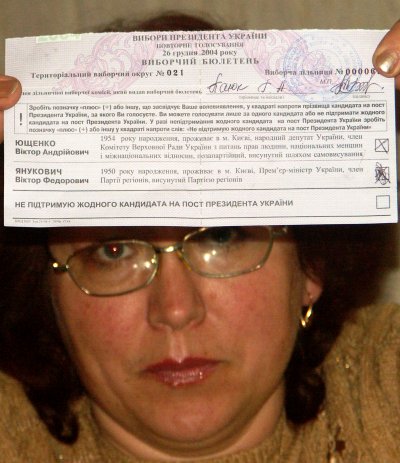
During the ballot count, an invalid ballot is
displayed to the
observers (the ballot is invalid because there are marks in two
squares).
Both the
ballot
and the control coupon contain numbers identifying the voting station
(in the example: 021 and 000067). When the commission delivers the
ballot to the voter, the name and the signature of a member of the
commission are added both to the ballot and to the control coupon.
Additionally, the
number and the signature of the voter are added to the control coupon
(but not to the ballot).
The text accompanied by a big "!"
sign instructs the voter to express his choice by making the "plus" sign (+) or another sign
in the corresponding square in the ballot. Three choices are offered,
in this order: Yushchenko,
Yanukovych, and
"I support no candidate for the
office of President of Ukraine".
Comments
Control coupons:
I do not
understand the role of the control coupons, as they are redundant
with the list of voters (a
key document held by the precinct electoral commission): the coupons
are
filled in with information and signatures also present in the list of
voters.
Features of the
ballot: The numbers present on the ballot, and the name and
signature of a member of the commission, are anti-fraud devices.
Specifically, one fraud method well-known in former Soviet nations
consists in providing voters with forged ballots filled in in advance
in
favor of
a given candidate. The voters are then rewarded for (or intimidated
into) voting with these ballots, instead of the genuine ones. To make
sure that
voters actually use the forged ballots, the
organizers of fraud ask them to bring back the blank, genuine
ballots received at
the voting station.
Numbers in the ballot significantly complicate forgery from a
logistical point of view: they make it necessary to use ballots forged
specifically for every given voting station, and this is more
complicated than obtaining one big batch of forged ballots, and using
it nationally.
The handwritten name and the signature in the ballot further
complicate forgery. Unlike the production of the ballot itself, these
elements are under the control of the relevant precinct electoral
commission, and even if fraud organizers have access to a source of
forged ballots, they still need to separately forge these elements.
Vote secrecy: Certain
features of the ballot are detrimental to the secrecy of the vote.
Specifically:
- While delivering a ballot, a commission member may mark it, by
appropriately adjusting his signature or the way he writes his name.
- The voter can make any sign of his choice in the square
corresponding with his vote; he can therefore be intimidated into
making a specific sign, that will make his ballot recognizable, and
allow an observer to later verify the vote. To compare:
- Polish ballots are similar to Ukrainian ones, except that in
Poland a cross is the only sign accepted for expressing a vote.
- In France, voters must not write or mark anything
on ballots; instead, they vote by inserting the
relevant ballot into an
envelope (there is one separate ballot per candidate). In France, a
ballot bearing any writing or any marks is declared
invalid.

Two members of the commission carry the mobile
ballot box from one voter's home to another, accompanied by one
observer
for Yanukovych (on the left), and one from Poland (behind the
camera).
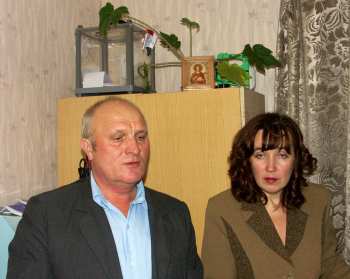
While not in use, the mobile ballot box was
stored overhead in the voting station, next to a religious icon. The
persons in front are Yuri Muzychuk, president of the commission (left),
and Olga MItchyk, secretary.
Voting at home
In Ukraine, those
who are unable to go to the voting station, have
the right to vote at home. For this purpose, each voting station has a
mobile ballot box, and a car at its disposal.
During the October 31 and the (later annulled) November 21 ballots,
the procedure for voting at
home acquired a reputation of providing a good occasion for fraud. Let
us
explain why.
During these two ballots,
the
law was not specific about the presence of observers during the vote at
home, and many commissions did not allow observers to travel in the
voting station's
car. Voting at home was conducted by three members of the electoral
commission, representing three different candidates. However, among the
24 candidates in the election, many were politically connected with the
government in place, and it was easy to find three members of the
commission who officially represented three different candidates, yet
in
reality were all connected with the government. In these conditions,
fraud was not difficult to organize.
Voting at home was in fact available to anyone who requested it: no
medical certificate was required, and the law provided for no
verification of the voter's inability to go to the voting station. This
explains why voting at home was a large-scale phenomenon, and fraud
connected with it was quantitatively important.
The law of December 8, 2004 changed the situation. Under this law,
one
commission member for each run-off candidate is allowed to be
present during vote at home. The new law only allows one
mobile ballot box in
each
voting station (previously, multiple boxes were commonly used,
further complicating the observers' work). The new law also
restricts voting at home to those with
the official status of severely disabled persons ("first group
disability"). Thus, the scale of the
procedure (and the magnitude of any fraud that could be based
on it) is severely limited.
The latter restriction was judged
discriminatory and annulled by the Constitutional Court on
December 24. The judgment was perfectly clear by itself, but
nevertheless led to much confusion: for example, on election day I was
told by several persons that people with "first or second group of disability"
status were now allowed to vote at home (this was not true: the
judgment extended
the procedure to all who declare that they need it, without
regard
to any official disability classification).
As a result of the confusion and of short time limits, in Vola
Kovelska the restriction
imposed by the law of December 8 was effective: those who could
have benefited from the December 24 judgment did not manage to file
the required paperwork before the December 25 noon deadline. (Note:
for an overwhelming majority of Ukrainians, Christmas is on January 7,
not
on December 25.)
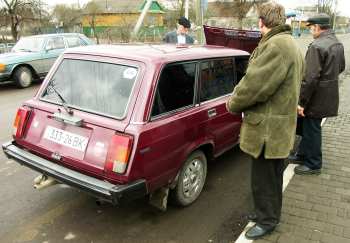
The voting station's car is a Lada. The hood
is open, indicating that the car is not working perfectly.
What I observed: In Vola
Kovelska, twelve persons voted at home. Yanukovych and the Republic of
Poland had observers in the voting station, and one observer from each
group was invited to travel in the voting station's car, in addition to
two
members of the commission, and to the driver.
Several handicapped voters made strong anti-Yanukovych and/or
pro-Yushchenko comments while
voting, some did not want to observe vote
secrecy and wanted to show everyone present that they voted for
Yushchenko. This behavior contrasts with the atmosphere
reigning in the voting station, where, as prescribed by law,
almost no political
statements or demonstrations were made.
I observed no violations of law connected with voting at home,
except for the less-than-perfect respect of vote secrecy.
Voting with another person's help
Ukrainian law allows disabled persons to vote with help from another
person. This procedure can be used both at home and at the voting
station. In the latter case, the person who helps a voter can enter the
voting booth with him.
The law only allows a voter to receive help from a fellow voter,
simultaneously present at the station for voting (or present in the
voter's home). Help
by other persons, especially by commission members or by observers, is
not
permitted, so that these persons cannot intimidate voters by offering
unwelcome help. This restriction was fully respected in Vola Kovelska.
Unfortunately, the electoral commission has no
reliable way to verify whether a given voter genuinely needs help.
Specifically, the law requires no proof of disability and no medical
certificate. This opens the way for intimidation of voters by other
persons (especially
relatives), who want
to control their vote under the pretext of offering help.
No record is kept regarding this special procedure (the fact that a
given voter received help is not recorded). Therefore, it is very
difficult to assess the scale of this
procedure and the magnitude of problems
it can possibly lead to.
I have no reason to believe that this procedure was actually used in
Vola
Kovelska to exert undue control over anyone. However, for reasons
stated above, I am unable to tell for sure.
Example vote
The following sequence shows three features of the voting procedure:
voting at home, voting with another voter's help, and the disregard for
vote secrecy.
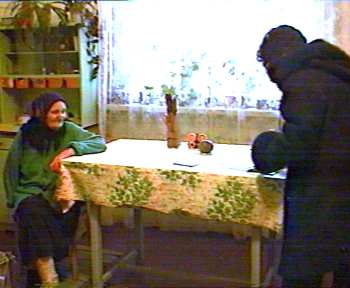
Voting at home begins: the disabled voter is
on the left, a member of the commission is on the right (another member
of the commission and two observers are also present).
The member of
the commission checks the disabled voter's domestic passport [soviet
name for an
identity card], and looks up
the voter's name in the list of voters.
|
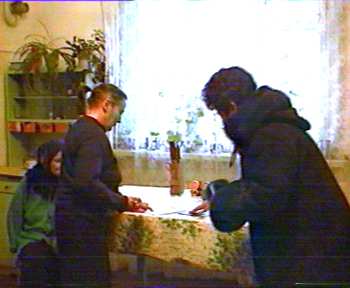
A family member arrives to help the voter.
|
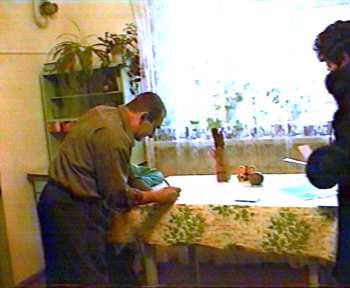
For a reason unknown to me, they change their
minds: another family member
comes to help the voter. He signs the list of voters in place of the
voter. Then, the family member fills in the ballot in presence of the
voter [not recorded in order not to further diminish vote secrecy].
|
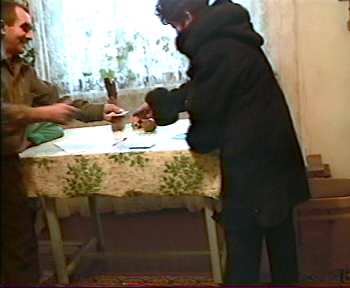
Then, the commission member discovers that the
control coupon was not cut off from the ballot, so she takes back the
(already filled-in) ballot, cuts off the coupon, and gives the ballot
back to the family member.
|
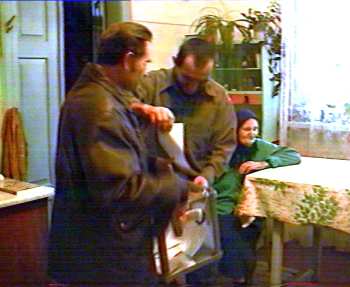
The family member begins inserting the
ballot into the box...
|
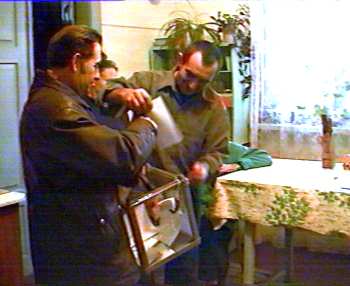
...and, remembering that the ballot is
supposed to be folded, takes it back
|
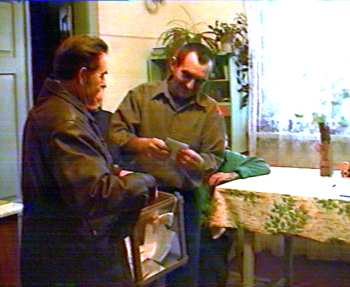
... folds it
|
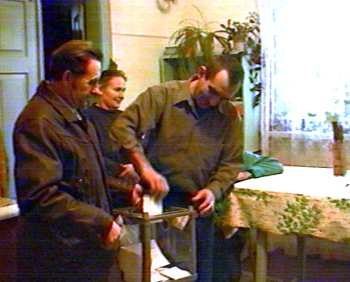
... and finally inserts it into
box.
|

Header of a judgment ordering the
registration of a voter (click on the image to see the complete
judgment).
|
Election-day voter
registration
It was possible for voters to get
registered (get added
to the list of voters) during the December 26 vote. This possibility is
quite extraordinary: in
most countries, lists of
voters are prepared and made final in advance.
Election-day voter registration could only be done by a decision of
a court of justice. In
Vola Kovelska, five voters were registered in this way, by judgment
of the court in the nearby city of Kovel.
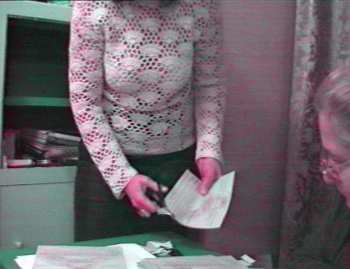
A member of the commission cuts corners off
unused ballots (I beg the lady's forgiveness for showing her with
her head cut off).
Ballot counting
At the beginning of the count, all members of the commission were
asked by the president to surrender pens, to prevent ballot alteration
(reportedly, the alteration of ballots during the count was a fraud
method used in Ukraine in the October 31 and November 21 votes).
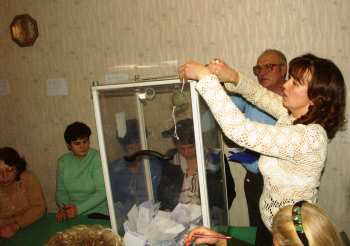
A member of the commission unseals a
ballot box.

Immediately after emptying ballot boxes, the
commission unfolds and counts ballots.
Each step in the ballot counting procedure started
with
the commission president reading aloud the relevant chapter of the
electoral law.
The first step was performed while the ballot boxes were
still sealed. It consisted in disposing of unused ballots: the ballots
were counted, had their bottom-right corners cut off, and were stuffed
into
envelopes.
Then, the ballot boxes were unsealed, the presence of control sheets
inside was verified, and ballots were unfolded and counted (a control
sheet is inserted into each box before the beginning of the vote, and
bears the signatures of all members of the commission). Control coupons
were also counted, and the number of ballots was compared with the
number of control coupons and with the number of ballots cast according
to the list of voters. No discrepancies were found.
Then, a commission member read aloud the content of all ballots,
and
the ballots were divided into four groups: Yushchenko, Yanukovych, "I
support no candidate for the office of the President of Ukraine", and
invalid ballots. The ballots in each group were counted and re-counted,
by pack of 50 (actually, only the Yushchenko group contained over 50
ballots).
Finally, a protocol was written. All ballots were stuffed into
cardboard boxes, and the boxes were sealed. The protocol and the boxes
with ballots were sent to the territorial electoral commission.
Behind locked doors: Ballot
counting in Ukraine is not done publicly. Three categories of
people
are allowed to be present: members of the
precinct electoral commission, official observers, and accredited
journalists. In Vola
Kovelska, ballots were counted behind locked doors.
Each precinct electoral commission comprises 12 or 16 members (in
Vola Kovelska, there were 12 members). All these 12 or 16 people
participate in
the counting procedure, they are simultaneously performing
operations that involve touching ballots. Each candidate is allowed to
send up to four observers to watch the counting. Each news outlet can
send up to two journalists to report on it. The number of international
observers is not limited by law.
Let us note that the general public is also
excluded
from observing the vote itself, not only the ballot counting: by law,
a voter is only allowed to
remain
present at the voting station for the time necessary for voting.
Opinion: International law
and OSCE rules do not support the
presence of the general public during the counting of
ballots. OSCE even opposes the continued presence of unauthorized
persons during the vote; see this
report, item 8.6 (such presence may, apparently, have an
intimidating or propaganda effect).
I
believe, however, that excluding the public from ballot count is
unfortunate, because
actions of public authorities should, to the extent possible, be
performed in view of everyone. Acting in plain view deters officials
from improper behavior, and increases the confidence of the public in
the authorities. The presence of official observers (and the presence
of journalists, when they are indeed present) is very positive
in this regard, but the presence of the general public would be even
better.

Results of the December 26 vote in Ukraine,
broken up
by region (oblast). [source]
[credits]
People, places, and politics
Nationally, Yushchenko was elected with 52 % of ballots,
Yanukovych received 44
% (this does not add up to 100 %, because the voters can also
choose "I
support no candidate").
In Vola Kovelska, the
turnover was 91.1 %. This
astonishing number
shows the great importance that Ukrainians attached to the election.
Yushchenko got 93.6 % of ballots in Vola Kovelska.
This is in
line with what happened nationally: in several regions
(oblasti) of western Ukraine,
Yushchenko got in excess of 90 % of
ballots (Volyn, where Vola Kovelska is located, is the most
north-western region of Ukraine, with 90.7 % of ballots for
Yushchenko).
The table below compares the December 26 results
with the results from October 31 (I did not record the results of the
annulled November 21 vote). Between the two votes, support shifted
tremendously in favor of Yushchenko: he gained extra 12 % of
all ballots, and Yanukovych lost more than half of his 10 %
support.
I tend to explain this partly by a genuine shift
in the public
opinion (due to the Orange Revolution), and partly by the suppression
of voter intimidation and fraud that had accompanied the October 31
vote.
I think that intimidation had taken place on
October 31, because I
heard voters say "I
have no fear" while voting for Yushchenko on December 26 (see above); people would not say this if they had not
been pressured or intimidated, at least to some extent.
Regarding
fraud, observe that the number of ballots invalid on October 31 was
extremely high (2.6 %). I don't know what happened exactly, but at
any
rate, the number of invalid ballots would not have been so high, had
the vote being conducted properly (certain fraud methods known in
Ukraine are based on invalidating ballots during the ballot count; this
is one possible cause of the high number of invalid ballots).
| In Vola
Kovelska: |
October
31 |
December
26 |
Total votes cast
|
574 |
(90.1
%
|
turnover) |
570 |
(91.1
%
|
turnover) |
Yushchenko
|
453
|
(81.0
%) |
|
531
|
(93.6
%)
|
|
Yanukovych
|
60
|
(10.1
%) |
|
26
|
(4.6
%)
|
|
other candidates
|
41
|
(7.3
%) |
|
-
|
|
|
against all candidates
|
5
|
(0.9
%) |
|
12
|
(2.1
%)
|
|
invalid ballots
|
15
|
(2.6
%
|
of valid ballots)
|
1
|
(0.2
%
|
of valid ballots)
|
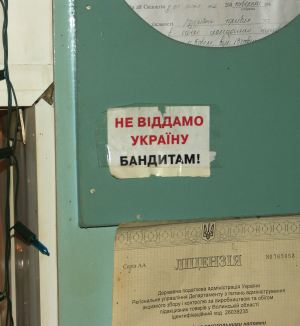
A pro-Yushchenko sticker in a restaurant in
Vola Kovelska.
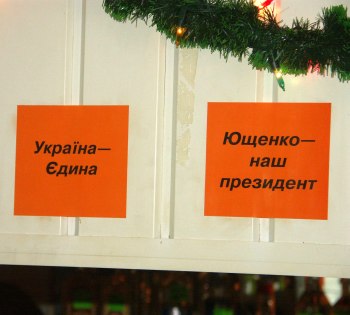
More pro-Yushchenko stickers.
The political and ethnic divide
The three stickers on display in the local restaurant say,
respectively, "We will not give
Ukraine to criminals," "Ukraine
is one," and "Yushchenko, our
president."
The reference to criminals is about Yanukovych, who served jail time
twice in the past
(under Soviet rule), for serious crimes unconnected with
politics.
The "Ukraine is one" sticker can be explained as follows.
As you can see in the chart above, Ukraine was sharply divided
into pro-Yushchenko and pro-Yanukovych regions. This roughly
corresponds with
the ethnic structure of the country: most Ukrainian speakers
supported Yushchenko, and many non-Ukrainian speakers supported
Yanukovych (most of them live in Eastern Ukraine and in Crimean
Peninsula (south), and
speak Russian).
During Orange Revolution, Yanukovych attempted to start the process
of cutting off eastern, Russian-speaking regions from Ukraine. This
looked like
a realistic threat, given the situation in the neighboring countries of
Moldova and Georgia: certain Russian-speaking regions of these two
countries are de
facto independent, and
are governed by local
pro-Russian dictators.

An inhabitant of Vola Kovelska.

A restaurant in Vola Kovelska.

The Palace of Culture, outside the city
People, history
In the past, the Volyn
region was ethnically mixed: in addition to Ukrainians it was
populated by many Poles and some Jews. From 1920 to 1939, the region
was part of the Republic of Poland
[see Wolyn
Voivodship]. Many Ukrainians did not accept this fact, and were
hostile to Poland. Rights of
ethnic Ukrainians were often not respected by the Polish government;
sometimes, the government went as far as using military force to
destroy Orthodox churches or to persuade villagers to change their
religion. Such actions stirred even more hostility from the Ukrainian
population. During World War Two,
Ukrainian forces performed ethnic cleansing operations, killing
approximately 100 000 Poles in Volyn.
In today's Volyn, I saw virtually no trace of the old ethnic hatred.
I was received very warmly, the people I met were evidently happy to
have Polish observers with them. Older people, who mentioned the Polish
past of the region to me, did it in neutral, if not positive, terms.
People in Vola Kovelska
generally
wanted me to take photos of them. I discussed politics in a friendly
atmosphere with a Yanukovych supporter. I was even invited to eat and
drink vodka with the electoral commission (I accepted meals, and
declined vodka; apparently, drinking vodka with meals is commonplace in
Ukraine, like drinking wine in France).
This is all in line with today's attitude of friendship between
Poland and Ukraine, which is prevailing in both nations. The Orange
Revolution received strong support from Poland, both from government
and from many individuals.
One villager openly expressed hostility towards Poland in front of
me.
This person was elderly: she probably remembers the time when
Ukrainians
opposed the Polish government in Volyn. The lady was offended by the
fact
that Poles supervise a Ukrainian election. She also mentioned Iraq (in
Iraq, over one thousand Ukrainian soldiers serve under Polish
command).
Places
You cannot see anything flashy or luxurious in rural Volyn. Roads
are
relatively bad, the number and quality of cars is quite low (most cars
are Ladas). But the basic needs of the population are satisfied: people
seem to have enough food, television, and even telephones. To my
subjective eyes, today's Volyn resembles rural Poland just after the
end of
communism (1989), except that rural Poland had very few telephones in
1989. Like Poland in 1989, today's Ukraine is in the process of leaving
behind a corrupt political system, and enters democracy.
The Palace of Culture outside the city, shown on the right, is
a typically Soviet feature of the landscape: it is not conveniently
located (see photo in context), and looks
oversized, but is
highly visible, and, most certainly, this is why it was built (some
Party Secretary must have been incredibly proud, a number of years
ago).
Conclusion
On December 26, Ukraine succeeded in getting rid of massive fraud
that
had plagued the previous vote, and in conducting a truly democratic
presidential
election. This is what international observers generally report (see
here,
here,
here, and here), and this is
what I
observed in Vola Kovelska.
I may add that the I met a very friendly atmosphere.
The electoral procedure did, however, have some flaws. Vote secrecy
was not perfectly ensured. The procedure of "vote with
another person's help" was conducted with little control and no
reporting, making it difficult to rule out undue influence of voters'
relatives. The conditions to meet in order to vote at home were changed
two days before the vote, confusing the voters, and leading to an
inconsistent implementation of the law.
Ukraine will most certainly enact now a new electoral law, and we
may hope that all these points will be properly addressed there. (The
law of December 8, 2004 was temporary, and will not apply in future
elections.)
Regarding vote secrecy, however, procedural improvements are most
certainly not enough: an
educational effort will be needed to ensure that the importance of vote
secrecy is generally understood. Let's not forget that Ukraine has a
long history of Soviet elections, where all democratic rules were
consistently broken; this created bad habits, and I believe
that the lack of attachment to vote secrecy is one of these habits.
The vote at home procedure is probably the most bizarre feature of
Ukrainian elections. Although it is not necessarily a bad idea, it is a
possible source of fraud, and has Stalinist roots: under
Stalin (or generally under Soviet Union), bringing the
ballot box to the voter's home was the most certain way to increase
turnout, and, additionally, to distinguish between voters who
willingly boycott the election (and therefore deserve punishment), and
those who are simply sick, drunk, or otherwise unable to participate.

The observers' bus (with a spelling error).

My international observer's card.
The group of
observers
I belonged to one of the many groups of observers sent by Prawo i
Sprawiedliwość (PiS), a Polish political party friendly to
Yushchenko. PiS made it clear that you do not need to be their
sympathiser in order to participate. As a result, PiS card-carrying
members were mixed with PiS opponents, leading to interesting political
discussions in the bus. Some
participants progressively began to dislike PiS
because of the way the trip was (dis)organized. The worst point in the
organization was the trip from Warsaw, Poland, to Kovel. The distance
by road is 330 km, but for reasons I cannot understand we followed a
600 km route through Przemyśl, Poland, then Lvov, Ukraine. Due to
various stops connected with the general lack of organization, the trip
lasted 21 hours. This gives an average speed of 29 km/h, and took as
much time as travelling at 16 km/h (10 mph) through the shortest route
(a slow
bicycle's speed).
I still have some gratitude towards PiS, as a badly organized yet
interesting trip is better than no trip at all. And they even paid me
60 hryvny (10 dollars) to buy food (food is cheap in Ukraine).
Click to see a photo of me
(different place, different time).
Copyright,
license and credits
This document is Copyright (C) 2005 by Marcin Skubiszewski. The
images
embedded within are likewise Copyright (C) 2005 by Marcin Skubiszewski,
except: photo of an Orange Revolution gathering (by Vladimir Ivshin,
originally published by Wikipedia)
and the map representing
election results (by Sven Teschke, originally published by Wikipedia). Redistribution of the
document, including all images
without exception, is permitted under the terms of the GNU Free Documentation
License.

Letters received
Received Thu May 05 14:34:33 2005 (sender's email address concealed
to avoid spam)
Hi, and congrats on your brilliant web site! I wish I had the time
and resources to do one myself; but I am running the following
campaign, and I would very much appreciate it if you could post this
message on your site:
Please sign, promote and publish! Thanks!
"Assert Ukraine's right to be taken seriously as a potential member of the
European Union. Please sign the petition and spread the word!
The courage of teenagers who camped in Bankova Street within yards of
heavily armed police, shames the politicians who sit 1000 miles away
in Brussels, rejecting the possibility of Ukraine's future membership
of the European Union because they're scared of the Russians."
From Philip Giddings, Petition author and British international
election observer in the 2004 Ukrainian presidential elections and
Orange Revolution (with the delegation of the Ukrainian Congress
Committee of America)

The publisher of this website: mm@skubi.net
: To
receive information about new content of this website (most of the
content is in Polish):
- send an e-mail (may be empty) to
notify@skubi.net
(your e-mail address will not be forwarded to anyone except the website editor (Marcin Skubiszewski), and will be used exclusively to notify you of new content appearing here)
- or you can use RSS
 . .
|
The forum for this text is here (click)

 (en)
(en)
 (ru)
(ru)
 (fr)
(fr) (en: part I –
part II –
part III -
part IV)
(en: part I –
part II –
part III -
part IV) (fr)
(fr)
 (de)
(de) (de)
(de)






























